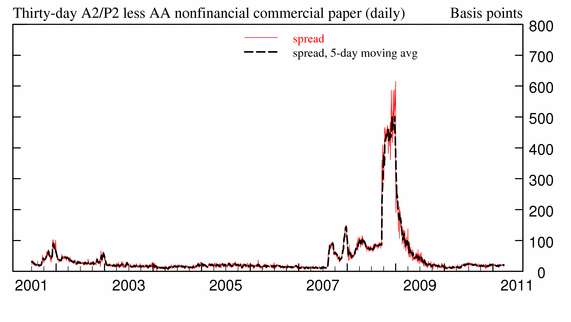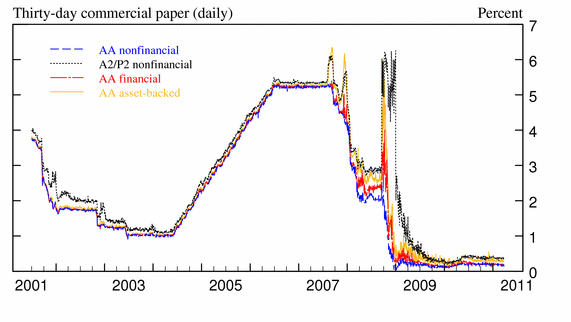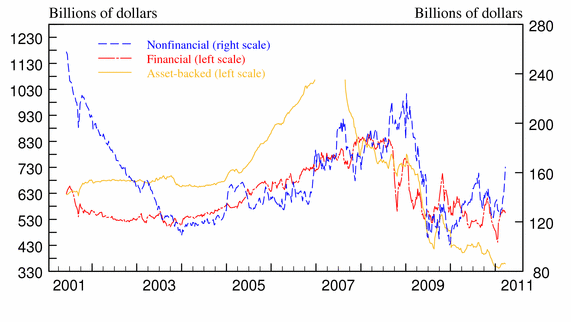I am sitting in the bathroom of a hotel room that I paid way too much for at 3 am, because the air conditioning sounds like a garbage disposal and the walls are thinner than vietnemese rice paper rendering the neighbor's conversation a just audible accompaniment to the clang of the window unit.
And for this I blame Greenspan, and whether this madness continues now lies in the hands of his successor.
I am still amazed - shocked and awed if you will - that people are surprised that the credit markets are where they are today. To me this conclusion is as evident as the good looking guy getting the good looking girl in a Hollywood tentpole conclusion.
Following the excesses of the last few years, and in line with history, we are entering a correctionary period.
Blaming Greenspan fully for this result is of course a slight over simplification. Of course Adam Smith and other economists as well as free market advocates like Milton Friedman should get some credit too, but I digress...
Back to this overpriced room and how it and I got here.
In late 2001 and 2002, following the most demoralizing and evil attack that modern cultures have witnessed, the US Economy was in a sorry state and in desparate need of boosting (I mean 9-11 though Enron and its cohorts were also huge downers). So Greenspan did what any good economist would do to rectify the situation - he threw money at the problem and let the invisible hand, through incentives, sort the whole thing out...and sort it, it did.
Over the next few years, as the Bank of Japan used a similar strategy, the Fed dumped a ton of capital into the system, and as any good free market participant is bound to do, financial engineers from NYC to HK jumped into action trying to make those incentives turn into personal profit.
It took a bit of time but within a couple of years a few exciting, and I think predictable, results emerged.
Through fancy deregulated vehicles called Hedge Funds and Private Equity funds, the rich got richer. These investment vehicles were the perfect avenue through which people with money and credit were able to tap into the cheap debt provided by the government. Sure the path wasn't direct, but at base the idea is simple: borrow money for less than you should be able to - pay really smart dudes to figure out a way to "invest" that money (or take advantage of the inherent discount to fair value provided by the fed) - and count on incentives and Math to sort out the rest. And unsurprisingly, it worked. Anyone who reads the business section of the Wichita Times will tell you that hedge fund managers are the new robber barons, but remember, these dudes were always managing and making money for other Qualified Investors (aka dudes who were already rich).
Next result, and this one is the sad and perhaps less predictable one, the poor got poorer. At first this struck me as unintuitive, but with a little thought it started to make more sense. Basically, poverty, or more importantly relative poverty, is measured on a - you guessed it- relative basis. So it isn't so much that the poor got poorer per se, as much as they didn't get as rich as the rest of us. And that makes sense if you think about it. In order to partake in the partay of cheap and free money, you gotta understand how the whole financial game works, and this game is kinda complicated...so unless you have education, I mean money, I mean education...I think you get the rest.
And driving this giant wedge was not only financial juggernautdom, but the good ole US real estate market. Because cheap money not only drives up returns on big bets, but also on small ones, like buying a 19th century house in Nantucket and slapping a sign on the front and calling it a B+B, people all across the country jumped aboard the gravy train.
This one deserves a bit of elaboration because this is where the mess hits home, literally.
Basically, here is how dudes get rich in real estate: borrow money to buy a property, rent that property out, pay back the loan with the proceeds, sell the property hopefully for more than you paid for it originally.
This game is old and frankly simple, which is why lots of not so bright dudes make money in the "real estate business" (full disclosure: I worked in real estate investing a couple of yrs back).
Well what happened when the financial engineers looking to put that massive amount of free money to work intersected with the concept of the American Dream of homeownership would have brought a year to ole Mr. Smith's eye. The engineers enginered a way to structure products in such a way as to make lending to people who wanted to own a home easier. This process, called securitization, has actually been going on long before the current boom, but what happened when money got super cheap was the amount of capital that needed to be "put to work" got to be too big for the traditional structures. And at the other end of the process, the mirage of the American Dream (and the cool trick of DIY real estate investing) became super-duper-alluring-er to people across the country.
So...along came, I know it is getting old but I will just say it once, Subprime Lending! Well, this is a couple of steps removed, but the gist is super incentivized investor dudes paid incentivized engineer dudes for complicated instruments that kinda incentivized dudes said would pay back money from a bunch of incentivized by dream dudes who were lent money by incentivized to lie dudes. Or, hedge fund and other funds invested in CDO's sold by investment banks that were rated by credit rating agencies and basically consisted of a bunch of promises to pay which at base were made by people who bought a house that they could barely afford and were told which loan to take by a mortgage broker who got paid, not for doing credit analysis on the borrower, but rather by convincing said borrower to take whichever loan paid him the highest commission and which loan, as it turns out often had fancy crazy features like "reset rates" or "prepayment penalties" likely because the rich dudes who were investing the money to fund this whole thing had done well to hire smart dudes who knew that such features made the loans more valuable - on paper.
Whew, that is a mouthful, and lots of stuff is going on in there. The point is: people acted as they should be expected to act in a capitalist economy and stuff got out of hand as the structured finance products fueled a real estate boom that dwarfs all other booms in comparison.
And now...
Dudes who bought on a dream that housing prices would continue to rise are screwed.
Dudes who borrowed money with terms in their loans that they did not understand are screwed.
Dudes who structured the products to sell the loans to fund the dreams and the homes are screwed.
...I don't know why she swallowed the fly...(couldn't resist)...
Anyway, you get the point.
But the problem, or at least the one that is getting Bernanke's attention, is that this what I will call "screwed effect" is now threatening to impact the rich dudes, and they don't like that too much.
But unlike the past, before the real estate boom, there is no clearly obvious place for a new flood of capital to go even if Big B were to pull out the Greenspan Card (way to many ironies in that name to call out) and give the rich and super incentivized dudes their "put" with another rate cut.
Will he do it? I don't know. Will it help if he does? Maybe for some but probably not for dreaming dudes and other fringe real estate players - there is only so much someone can pay for a shitty piece of property, even in Nantucket.
All I know is that if he does cut by more than a hundred bps, I am going to buy as many domain names and property that I can in SecondLife and in Wii-land ahead of Adam Smith's invisible hand and the next tidal wave of incentives finding ways to play with free money.





